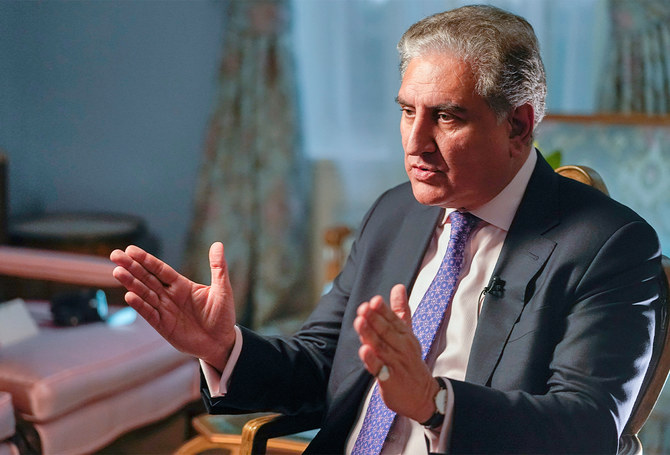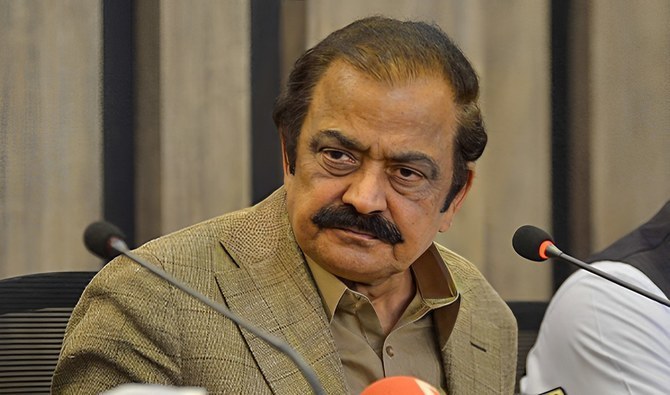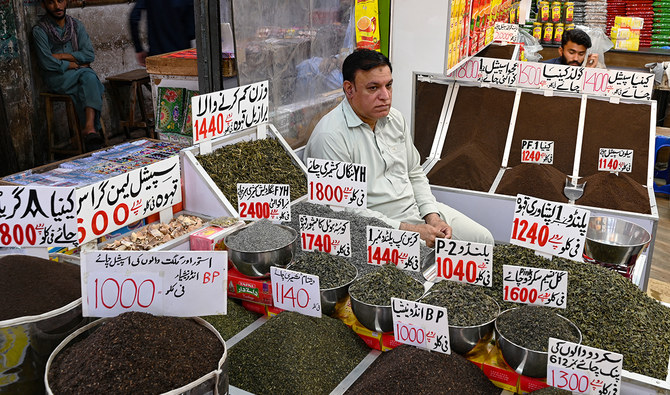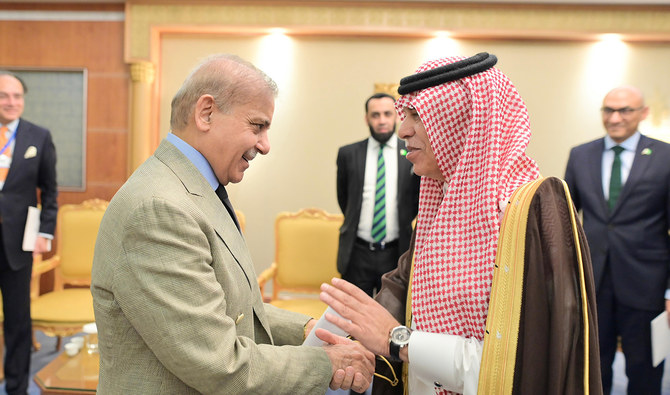UNITED NATIONS: Be realistic. Show patience. Engage. And above all, don’t isolate. Those are the pillars of an approach emerging in Pakistan to deal with the fledgling government that is suddenly running the country next door once again — Afghanistan’s resurgent, often-volatile Taliban.
Pakistan’s government is proposing that the international community develop a road map that leads to diplomatic recognition of the Taliban — with incentives if they fulfill its requirements — and then sit down face to face and talk it out with the militia’s leaders.
Pakistani Foreign Minister Shah Mehmood Qureshi outlined the idea Wednesday in an interview with The Associated Press on the sidelines of the UN General Assembly’s meeting of world leaders.
“If they live up to those expectations, they would make it easier for themselves, they will get acceptability, which is required for recognition,” Qureshi told the AP. “At the same time, the international community has to realize: What’s the alternative? What are the options? This is the reality, and can they turn away from this reality?”
He said Pakistan “is in sync with the international community” in wanting to see a peaceful, stable Afghanistan with no space for terrorist elements to increase their foothold, and for the Taliban to ensure “that Afghan soil is never used again against any country.”
“But we are saying, be more realistic in your approach,” Qureshi said. “Try an innovative way of engaging with them. The way that they were being dealt with has not worked.”
Expectations from the Taliban leadership could include an inclusive government and assurances for human rights, especially for women and girls, Qureshi said. In turn, he said, the Afghan government might be motivated by receiving development, economic and reconstruction aid to help recover from decades of war.
He urged the United States, the International Monetary Fund and other countries that have frozen Afghan government funds to immediately release the money so it can be used “for promoting normalcy in Afghanistan.” And he pledged that Pakistan is ready to play a “constructive, positive” role in opening communications channels with the Taliban because it, too, benefits from peace and stability.
This is the second time that the Taliban, who adhere to a strict version of Islam, have ruled Afghanistan. The first time, from 1996 to 2001, ended when they were ousted by a US-led coalition after the 9/11 attacks, which were directed by Osama bin Laden from Afghanistan.
During that rule, Taliban leaders and police barred girls from school and prohibited women from working outside the home or leaving it without a male escort. After they were overthrown, Afghan women still faced challenges in the male-dominated society but increasingly stepped into powerful positions in government and numerous fields.
But when the US withdrew its military from Afghanistan last month, the government collapsed and a new generation of the Taliban resurged, taking over almost immediately. In the weeks since, many countries have expressed disappointment that the Taliban’s interim government is not inclusive as its spokesman had promised.
While the new government has allowed young girls to attend school, it has not yet allowed older girls to return to secondary school, and most women to return to work despite a promise in April that women “can serve their society in the education, business, health and social fields while maintaining correct Islamic hijab.”
Pakistan, which shares a long border with Afghanistan, has a long and sometimes conflicted relationship with its neighbor that includes attempts to prevent terrorism there and, some say, also encouraging it, which Islamabad denies. The Islamabad government has a fundamental vested interest in ensuring that whatever the new Afghanistan offers, it is not a threat to Pakistan.
That, Qureshi says, requires a steady and calibrated approach.
“It has to be a realistic assessment, a pragmatic view on both sides, and that will set the tone for recognition eventually,” the Pakistani minister said. The good news, he said: The Taliban are listening, “and they are not insensitive to what is being said by neighbors and the international community.”
How does he know they’re listening? He says the interim government, drawn mostly from Afghanistan’s dominant Pashtun ethnic group, made some additions on Tuesday. It added representatives from the country’s ethnic minorities — Tajiks, Uzbeks and Hazaras, who are Shiite Muslims in the majority Sunni Muslim country.
“Yes, there are no women yet,” Qureshi said. “But let us let the situation evolve.”
He stressed that the Taliban must make decisions in coming days and weeks that will enhance their acceptability.
“What the international community can do, in my view, is sit together and work out a roadmap,” Qureshi said. “And if they fulfill those expectations, this is what the international community can do to help them stabilize their economy. This is the humanitarian assistance that can be provided. This is how they can help rebuild Afghanistan, reconstruction and so on and so forth.”
He added: “With this roadmap ahead, I think an international engagement can be more productive.”
On Wednesday night, UN Secretary-General Antonio Guterres said after a meeting of the five permanent members of the UN Security Council that all five nations — the United States, China, Britain, Russia and France — want “an Afghanistan at peace, stable, where humanitarian aid can be distributed without problems or discrimination.”
He also described a hoped-for “Afghanistan where the rights of women and girls are respected, an Afghanistan that won’t be a sanctuary for terrorism, an Afghanistan where we have an inclusive government representing the different sectors of the population.”
Qureshi said there are different forums where the international community can work out the best way to approach the situation. In the meantime, he asserted, things seem to be stabilizing. Less than six weeks after the Taliban seized power on Aug. 15, he said, Pakistan has received information that the law-and-order situation has improved, fighting has stopped and many internally displaced Afghans are going home.
“That’s a positive sign,” Qureshi said.
He said Pakistan hasn’t seen a new influx of Afghan refugees — a sensitive issue for Pakistanis, who are highly motivated to prevent it. A humanitarian crisis, a foundering economy and workers who return to jobs and school but aren’t getting salaries and don’t have money could cause Afghans to flee across the porous border into Pakistan, which has suffered economically from such arrivals over decades of conflict.
Qureshi prescribed patience and realism. After all, he says, every previous attempt to stabilize Afghanistan has failed, so don’t expect new efforts to produce immediate success with the Taliban. If the United States and its allies “could not convince them or eliminate them in two decades, how will you do it in the next two months or the next two years?” he wondered.
Asked whether he had a prediction of what Afghanistan might be like in six months, Qureshi turned the question back on his AP interviewer, replying: “Can you guarantee me US behavior over the next six months?”
Pakistan says international community can’t ‘turn away’ from reality of Afghan Taliban
https://arab.news/p7z7v
Pakistan says international community can’t ‘turn away’ from reality of Afghan Taliban

- Pakistan’s government is proposing global powers develop a road map that leads to diplomatic recognition of Taliban
- Expectations from Taliban include an inclusive government and assurances for human rights, especially for women and girls
Rana Sanaullah, another Nawaz Sharif loyalist, appointed adviser to Pakistan PM

- Sanaullah’s appointment comes two days after foreign minister Ishaq Dar was named deputy prime minister
- Analysts believe the appointments indicate Nawaz Sharif is trying to assert indirect control over the government
ISLAMABAD: President Asif Ali Zardari on Tuesday appointed Rana Sanaullah adviser to Prime Minister Shehbaz Sharif, according to a post on the Pakistan president’s official account on platform X.
Sanaullah is considered a close aide of PM Sharif’s elder brother, Nawaz Sharif, who is also a three-time former prime minister.
Sanaullah has previously served as the federal interior minister and provincial law minister for Pakistan’s most populous Punjab province.
“President Asif Ali Zardari has approved the appointment of Rana Sanaullah Khan as Adviser to the Prime Minister on Political and Public Affairs,” read the post on President Zardari’s official social media account.
“The President approved the appointment of Rana Sanaullah Khan on the advice of the Prime Minister under Article 93 (a) of the Constitution.”
Sanaullah’s appointment comes two days after Foreign Minister Ishaq Dar was named the country’s deputy prime minister. Dar, a 73-year-old chartered accountant, is another close Nawaz Sharif ally.
The elder Sharif, who returned to Pakistan in October 2023 after years of self-exile, was widely seen as the favorite candidate for the prime minister’s office ahead of the February 8 national polls, and was believed to be backed by the country’s powerful army.
However, the three-time former prime minister decided against taking the PM’s office after the elections failed to produce a clear winner, leading to speculation that his role in the country’s politics had come to an end.
Analysts widely believe that the recent appointments of Dar and Sanaullah indicate Nawaz Sharif is attempting to assert control over the government through indirect means.
Pakistan to block mobile connections of over 500,000 individuals for not filing tax returns

- In December, the Federal Board of Revenue said Pakistan had around 5.2 million taxpayers in 2022, out of a population of 240 million people
- The government has decided to digitalize tax collection system to prevent leakages even as large segment of economy remains undocumented
ISLAMABAD: Pakistan has decided to block mobile phone connections of more than 500,000 individuals who had not filed their income tax returns for Tax Year 2023, the country’s tax regulator said on Tuesday.
Pakistan’s narrow tax base and enduring tax evasion issue have often led to the problem of insufficient revenue collection. The shortfall exacerbates the government’s tendency to run a high fiscal deficit, often financed through domestic and international borrowing.
In Dec., the Federal Board of Revenue (FBR) said the country had a “very narrow tax base” of around 5.2 million people in 2022, out of a population of 240 million people and it had planned to add 1.5 million new taxpayers to the existing base during this fiscal year.
On Tuesday, the FBR issued an order to enforce filing of returns by the persons who were not appearing on the active taxpayer list.
“FBR has taken decisive action by issuing an order to disable mobile phone SIMs associated with 506,671 individuals who fall under the aforementioned category,” the regulator said in a statement.
“The Pakistan Telecommunication Authority (PTA) and all telecom operators have been instructed to enforce the ITGO with immediate effect, ensuring swift implementation of the order.”
These mobile connections would remain blocked until restored by the FBR or the concerned Inland Revenue commissioner, according to the statement. Telecom operators were asked to furnish a compliance report to the FBR by May 15.
Amid its efforts to broaden the tax base, the government of Prime Minister Shehbaz Sharif has recently decided to digitalize the tax collection system to prevent leakages even as a large segment of the national economy remains undocumented.
Pakistan, which has been facing an economic meltdown, is also making efforts to introduce structural economic reforms. The South Asian country has to meet a primary budget deficit target of Rs401 billion ($1.44 billion), or 0.4 percent of its gross domestic product, for the current fiscal year before the government presents its budget in June.
US envoy hosts Pakistan cricket team in display of support ahead of T20 World Cup

- Pakistan’s preparations for the mega event that will be co-hosted by the West Indies and the US
- Both Pakistan, US have been slated to play within the same group stage and will compete on June 6
ISLAMABAD: United States (US) Ambassador to Pakistan Donald Blome held a meet-and-greet session with the Pakistan cricket team at the US embassy in Islamabad in a display of support for the ‘Green Shirts’ ahead of the highly anticipated Twenty20 World Cup 2024, the US embassy said on Tuesday.
The development came amid Pakistan’s preparations for the mega event that will be co-hosted by the West Indies and the US in June.
Ambassador Blome welcomed the Pakistan team and cricket board chairman, Mohsin Naqvi, at his residence and extended his best wishes for the matches in the US.
“In dual gestures of sports diplomacy, Ambassador Blome presented the team members with a commemorative embassy cricket ball and autographed softball bat,” the US embassy said in a statement.
“The Pakistani team reciprocated by presenting the Ambassador with a signed cricket bat and team jersey.”
The US envoy later participated in an impromptu cricket demonstration with members of the Pakistan side.
Both Pakistan and the US have been slated to play within the same group stage and will compete in a highly anticipated game scheduled for June 6.
Organizers of the T20 World Cup games in the US have said that early ticket sales showed there was a huge demand for the sport in the country.
The highly anticipated clash in New York between cricket rivals Pakistan and India was over-subscribed by 200 times in the public ballot for tickets, the International Cricket Council said in Feb.
The 34,000-seat temporary venue, Nassau County International Cricket Stadium on Long Island, is already assured of a sell-out crowd for the June 9 encounter.
Pakistan says inflation expected to drop to 17.5 percent in May amid signs of economic recovery

- Finance ministry says Pakistan to achieve modest growth this year, enabling improved performance in the next fiscal
- It acknowledges higher fuel prices, saying they will be offset by the government’s initiative to reduce wheat flour prices
ISLAMABAD: Pakistan’s finance ministry said on Tuesday the country’s economy was showing signs of recovery, highlighting a downward inflationary trend that could reach 17.5 percent in the upcoming month of May.
The statement comes at a time when Pakistan received a disbursement of $1.1 billion from the International Monetary Fund (IMF) as the second and final tranche under a $3 billion standby arrangement secured last summer to avert a sovereign default.
Prime Minister Shehbaz Sharif said earlier in the day the money would help the country achieve greater economic stability, with his government striving for a bigger loan program for a longer duration.
The finance ministry said in its Monthly Economic Update and Outlook for April 2024 that the economy was “on a resilient track to achieve modest growth this year, setting the basis for better performance in the upcoming fiscal year.”
“Headline inflation observed the lowest reading after 21 months,” it noted. “In March, CPI [consumer price index] inflation recorded the third consecutive YoY [year-on-year] decline, dropping to 20.7 percent from 35.4 percent last year. This decrease was observed throughout the third quarter of FY2024.”
It added the inflation outlook for April 2024 continued a downward trajectory, with the government determined to reduce it by taking strict administrative measures.
The outlook report said the increasing crude oil prices in the international market had prompted the government to raise domestic fuel prices. However, the rise in these rates was expected to be offset by the government initiative to reduce wheat flour prices.
“Inflation is projected to hover around 18.519.5 percent in April 2024,” it continued. “However, there are expectations of a gradual easing further to 17.5-18.5 percent in May 2024.”
Pakistan’s economy witnessed a major inflationary pressure in recent years after its governments sought IMF assistance amid dwindling foreign currency reserves and depreciating national currency.
The international lender urged the country to carry out economic reforms – such as removal of subsidies and increase in fuel charges and power tariffs – which led to spiraling inflation and pushed about 40 percent of its population below the poverty line.
Last year in February, financial experts warned of spiraling inflation of up to 40 percent after official data revealed that weekly inflation had touched 38.4 percent on an annual basis.
However, the situation has gradually improved, though inflationary pressure still continues to remain on the higher side.
Saudi business delegates to soon visit Pakistan, help expedite economic cooperation — PM Sharif

- Pakistan is currently making rigorous efforts to attract investment from Saudi Arabia, other Gulf nations to support dwindling economy
- PM Shehbaz Sharif expresses resolve to work hard to implement consensus achieved in meetings with Saudi leadership on WEF sidelines
ISLAMABAD: Prime Minister Shehbaz Sharif said on Tuesday that a delegation of Saudi businessmen would soon visit Pakistan, which would help expedite economic cooperation between the two brotherly countries.
The statement came at the end of PM Sharif’s visit to Riyadh, where he attended a two-day World Economic Forum (WEF) summit on Global Collaboration, Growth and Energy for Development on April 28-29.
On the sidelines of the summit, the prime minister held meetings with Crown Prince Mohammed bin Salman as well as Saudi ministers of energy, economy and planning, and environment, water, and agriculture.
Sharif, upon the completion of his visit, said bilateral relations and economic partnership between Saudi Arabia and Pakistan were getting “stronger and stronger.”
“A delegation of businessmen from Saudi Arabia is visiting Pakistan in the next few days,” he was quoted as saying in a statement issued from his office.
“The speed of economic partnership between the two countries will be accelerated by the visit of the Saudi Arabian businessmen.”
He expressed his resolve to work hard to implement the consensus achieved at the leadership level between the two countries, saying that a record number of delegations had been exchanged between Pakistan and Saudi Arabia during the past two months.
“His Excellency Crown Prince Mohammed bin Salman issued special instructions to Saudi ministers regarding Pakistan, for which we are extremely grateful,” Sharif said.
“I also pay tribute to Saudi ministers, who made full preparations for the implementation of the consensus between the leadership [of the two countries].”
Pakistan and Saudi Arabia enjoy strong trade, defense and cultural ties. The Kingdom is home to over 2.7 million Pakistani expatriates and serves as the top source of remittances to the cash-strapped South Asian country.
Both countries have been closely working to increase bilateral trade and investment deals, and the Kingdom recently reaffirmed its commitment to expedite an investment package worth $5 billion.










